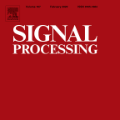In this paper, we study turbo codes from the digital signal processing point of view by defining turbo codes over the complex field. It is known that iterative decoding and interleaving between concatenated parallel codes are two key elements that make turbo codes perform significantly better than the conventional error control codes. This is analytically illustrated in this paper by showing that the decoded noise mean power in the iterative decoding decreases when the number of iterations increases, as long as the interleaving decorrelates the noise after each iterative decoding step. An analytic decreasing rate and the limit of the decoded noise mean power are given. The limit of the decoded noise mean power of the iterative decoding of a turbo code with two parallel codes with their rates less than 1/2 is one third of the noise power before the decoding, which can not be achieved by any non-turbo codes with the same rate. From this study, the role of designing a good interleaver can also be clearly seen.
翻译:暂无翻译




